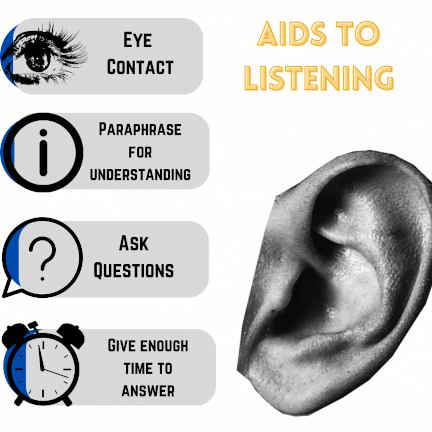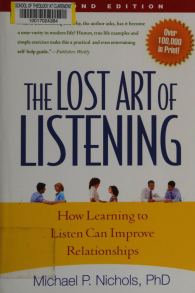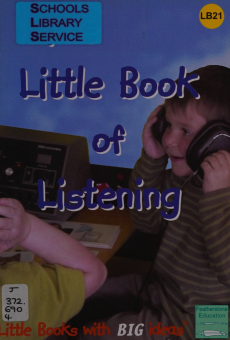The Hardest Thing You'll Ever Learn is
How to Listen
First Step - Acknowledge the Other
In most conversations there is a certain back and forth between speaker and listener, but some times a conversation topic or situation demands something different from you - for you to really listen.

Genuine listening means suspending the self (memory, desire, judgement) and existing for a moment for another person
- It's not about you
- Not about waiting to talk
- Not just silence
- Not passive attention
- Not about sharing ('That reminds me of when...')
- Not advising ('Well if I were you...')
- Not overly sympathizing ('Oh you poor thing....')
- Not joking (Is a type of dismissing speaker with failure to restrain)
- Not dismissing or ignoring (Cheats speaker of having their feelings acknowledged - don't upset me with your upset)
- Me too (not always inappropriate - sometimes makes listener feel understood, sometimes dismissed)
Effective questions keep the conversation on the speaker, cannot be answered by yes or no.
Acknowledge the feelings (without reassurances - they have a place, but reassurances can also sound condescending) -- When in doubt, listen!
Types of Listeners
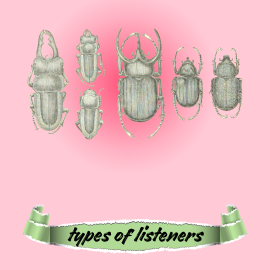
- Faker - feigns attention - continued eye contact, but not really there (think politicians)
- Self-conscious Listener - concerned with appearing to listen
- Amateur Therapist - listening is the leading role, focus on the listener's helpfulness, rather than the speaker's feeling
- Active Listener - paraphrasing to help the speaker concentrate on what they said, acknowledging what listener heard and keep going deeper if the listener chooses -> needs not to focus on listener's perceptiveness and not a demonstrative act
- Narcissistic talks about their needs, desires, self - redirects conversation back to self
- Egocentric doesn't talk about themselves but stuck in their way of thinking - their opinion on everything -> children who grow up with these types of parents feel alienated from their own experience. Their self is distorted by the biased mirror held up by parents.
Why is it so hard to listen?
You hear what you want, based on your assumptions
You become emotionally reactive -
Something in the speaker's message has triggered hurt or anger, short-circuiting understanding and provoking defensiveness - causing anxiety.
Procedure:
What Is Reflective or Active Listening: a way of paraphrasing, reflecting back to the speaker what they said. This is an opportunity to affirm or correct your perception. It is perception-clarifying device.
- Reflect using phrases such as 'Sounds like -----;' 'In other words, -----;' or 'You're saying ----.'
- When paraphrasing, try to reflect the emotional as well as factual content. 'Sounds like you feel ---- because ----.' Sounds a little stilted or unnatural, but you can incorporate it by adapting it to your natural speech patterns.
Reflective listening slows the conversation, so use the technique wisely.
Exercises:
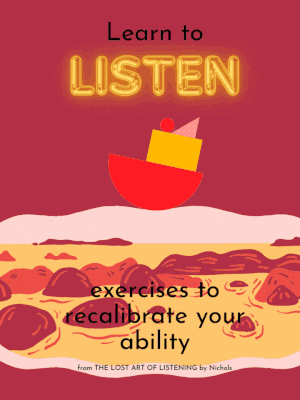
Listening-exercises-booklet.pdf
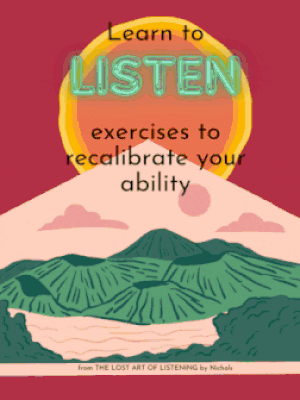
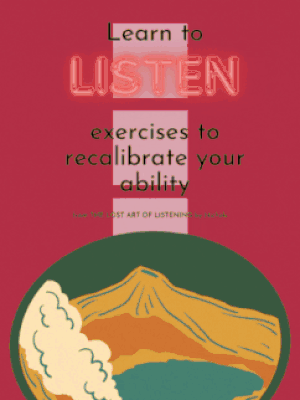
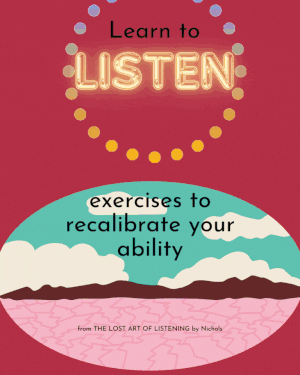
Listening exercises booklet4.pdf
Aids to Listening
(from Creative Conflict Resolution)
- Eye contact (nonverbal cue of attention)
- Try paraphrasing, especially when you don't understand the main idea (shows that you care enough to spend time getting the information correct)
- Give praise when deserved (not over doing it - insincere; nor too miserly - withholding)
- Redirect questions back to speaker (so they can think them out themselves)
- Describe behaviors in a nonjudgmental way (openness to the other and their ideas)
- Share personal information when appropriate (encourages trust)
- Avoid saying one thing with my body and one thing with words (shows sincerity)
- Wait five seconds for other to answer, before trying another question or prompting some idea (indicates real desire to hear answer)
- Don't interrupt (shows other what they are saying is important)
Activities:
![]() Activity! Listening Game
Activity! Listening Game
![]() Activity! Eyewitness
At odd times during the day, stop everything and say "Time for an eyewitness account!" Get an account of surrounds and what has just happened and by whom. Try it in the middle of a movie or show.
Activity! Eyewitness
At odd times during the day, stop everything and say "Time for an eyewitness account!" Get an account of surrounds and what has just happened and by whom. Try it in the middle of a movie or show.
![]() Activity! Sifting for five Ws
Tell child that you are listening for five Ws - who, what, when, where and why. As you read a story, ask child to find the answers for each.
Activity! Sifting for five Ws
Tell child that you are listening for five Ws - who, what, when, where and why. As you read a story, ask child to find the answers for each.
![]() Activity!Summarize
Ask child to summarize a story after hearing it or to retell the story in the shortest form. For older children, you can use the news - have child summarize newstories.
Activity!Summarize
Ask child to summarize a story after hearing it or to retell the story in the shortest form. For older children, you can use the news - have child summarize newstories.
![]() Activity! Pete Repeat
One child talks about their day, simple things, taking breaks for 'Repeat' to paraphrase what was said. Then switch who is pete and who is repeat.
Activity! Pete Repeat
One child talks about their day, simple things, taking breaks for 'Repeat' to paraphrase what was said. Then switch who is pete and who is repeat.
![]() Activity! Nonverbal
A lot of information is transmitted without words. Watch a tv show with the volume off. Ask child to tell you what happened in the episode.
Activity! Nonverbal
A lot of information is transmitted without words. Watch a tv show with the volume off. Ask child to tell you what happened in the episode.
![]() Activity! Mirroring
Have child face you. Tell them to follow your movements. Move hands and face. Let child follow for a minute or less. Then switch.
Activity! Mirroring
Have child face you. Tell them to follow your movements. Move hands and face. Let child follow for a minute or less. Then switch.
![]() Activity! Talk About Manners
Pros: convey respect and promote smooth interactions
Cons: mask genuine feelings and create artificial, conflict avoiding situations.
Talk about why using things like 'please' and 'thank you' make people more likely to fulfill a request. Who benefits from using polite terms? When is being polite not necessary or have a negative effective?
Activity! Talk About Manners
Pros: convey respect and promote smooth interactions
Cons: mask genuine feelings and create artificial, conflict avoiding situations.
Talk about why using things like 'please' and 'thank you' make people more likely to fulfill a request. Who benefits from using polite terms? When is being polite not necessary or have a negative effective?
![]() Activity! Caring Projects
Older children can pick larger projects with multiple moving parts, but for younger children try things like: Smile and say hello to five people. Do something nice for someone you know dislikes you. Go to a public place, like a supermarket and offer to assist an elderly person with a simple task for free. Come up with another.
Activity! Caring Projects
Older children can pick larger projects with multiple moving parts, but for younger children try things like: Smile and say hello to five people. Do something nice for someone you know dislikes you. Go to a public place, like a supermarket and offer to assist an elderly person with a simple task for free. Come up with another.

